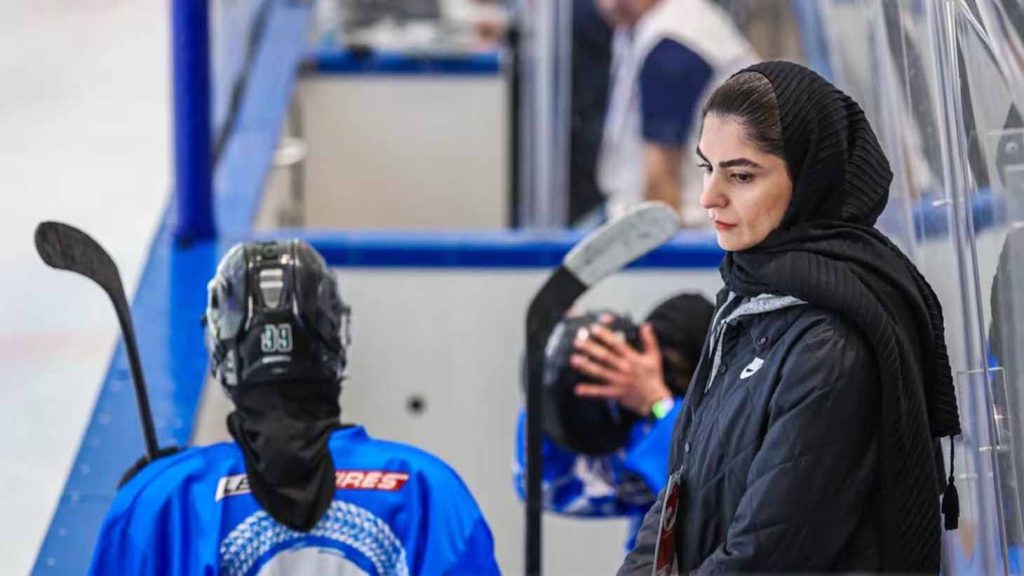
In the shadow of the Alborz Mountains lies one of Tehran’s busiest malls. And between designer storefronts and fast food kiosks sits IceBox, one of just six indoor ice hockey rinks in the country. There, young women lace up skates behind glass walls, skating into a world most of their peers never knew existed.
Watching them with an unshakable focus is their coach, Azam Sanaei.
At 35, Sanaei is the head coach of the Islamic Republic of Iran’s women’s national team and the first woman ever inducted into the nation’s ice hockey Hall of Fame. Hanging up her skates in 2024, she has turned her focus to building something few imagined possible: carving out space for women’s ice hockey in the Islamic Republic of Iran.
“I feel so much happiness when I’m at the ice rink,” the head coach told the International Ice Hockey Federation (IIHF). “I really hope that a lot of girls in Iran can experience this sport, and that they understand that they can break the stereotypes. They need to know that sport, especially ice hockey, is not just for men, and we can do anything we want.”
Building that belief was no easy task. Olympics.com takes you through the story of how Sanaei broke the ice and changed the game.

Picture by Azam Sanaei/IIHF
Silver and gold: Azam Sanaei’s historic runs to the top
Sanaei didn’t grow up skating on frozen ponds or competing in arenas. She began on inline skates at 14, long before ice hockey was even an option. That all changed in 2019 when the Islamic Republic of Iran joined world governing body, the IIHF, opening the door for women like Sanaei to take their passion to the ice.
Over the next five years, she helped build a team from the ground up, training, competing, and leading by example.
The women’s team first sent shockwaves through the region in 2023, when they stunned the ice hockey world with a silver medal at the IIHF Women’s Asia and Oceania Championships in Thailand. “Nobody was expecting such a great outcome, so everyone was quite shocked and surprised,” Sanaei said.
By 2024, the impossible had become inevitable. With Thailand, the champions, competing in another division, Iran arrived at the IIHF Women’s Asia and Oceania Cup in Bishkek, Kyrgyzstan, as the team to beat.
Wearing the captain’s ‘C’ for what would become her final tournament as a player, Sanaei led her squad through a flawless campaign. They defeated the United Arab Emirates 16–0, host nation Kyrgyzstan 6–0, India 10–0, and the Philippines 4–0 to capture a historic gold medal.
“All our competitors had much more experience in ice hockey than us,” Sanaei told Al Jazeera. “Our achievement can help all of Iran’s women to know that there is nothing that can stop them and, even with all the barriers in front of them, if they try, they will make it to wherever they want,” she added.

Just a few years earlier, the idea of a women’s national ice hockey team had been unthinkable. One year earlier, a silver medal had felt like a miracle. Now, gold around their necks, the Islamic Republic of Iran’s women’s ice hockey team had truly made history.
For Sanaei, the win was both a crowning moment as a player and the beginning of a bold new chapter as a full-time coach. These events were historic in more ways than one. For the first time, the team’s matches were broadcast live on Iranian national television, offering unprecedented visibility for both the sport, and women’s sport more broadly.
“It was such a huge step to have our games shown live on television,” said Sanaei. “It really means a lot. We hope that this continues and will have a positive effect on this sport.”
With the nation watching and young girls seeing themselves reflected on the ice for the very first time, the impact of that gold medal reached far and wide.

Picture by Azam Sanaei/IIHF
A skating sisterhood: “I really want the world to see what we’re capable of.”
Now coaching at Tehran’s aptly named IceBox, a rink tucked inside the sprawling Iran Mall, Sanaei juggles national team responsibilities, club matches, and her role as a personal trainer. She’s also mentoring a growing cohort of female coaches, many of whom are former teammates.
“I hope these connections help to put Iran on the map in the global hockey community,” she says. “We have a lot of talented girls here, and I really want the world to see what we’re capable of.”
The numbers back her up: according to the latest IIHF data, the Islamic Republic of Iran has 396 registered female players, more than four times the number of male players (98) currently active in the country.
“She’s been very effective in spurring the rapid growth and development of women’s hockey in comparison with men’s hockey in Iran,” said Kaveh Sedghi, President of the Iranian Ice Hockey Association. “Under her leadership, hockey has gained significant visibility.”
This spring, Sanaei joined the IIHF’s new HER Coaching Network, a global initiative to connect women coaches through mentorship and community. The programme was officially launched during the 2025 IIHF Women’s World Championship taking place 9-20 April. Sanaei is already seeing its impact, as the HER network is helping her dream bigger and connect with coaches she admires.
“What excites me the most is being part of a community,” she said. “It’s all about women, connecting with other coaches and athletes who have the same passion and seeing how we can learn from one another.”
She’s especially inspired by trailblazers like Jessica Campbell, a Canadian-born coach making waves as an NHL assistant with the Seattle Kraken: “I really admire her. She is such a trailblazer and has done a lot of incredible things as one of the first female coaches in professional men’s hockey.”
Sanaei may have swapped her captain’s jersey for a whistle, but she still commands the rink. There are challenges, of course: limited resources, scarce rink time, cultural roadblocks. But Sanaei isn’t skating alone.
With a growing team of coaches, a supportive federation, and global allies through the HER network, the ice beneath her feet feels just solid enough.


